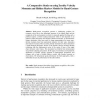11 search results - page 1 / 3 » Using Comparable Corpora to Solve Problems Difficult for Hum... |
ACL
2006
13 years 6 months ago
2006
In this paper we present a tool that uses comparable corpora to find appropriate translation equivalents for expressions that are considered by translators as difficult. For a phr...
AMDO
2008
Springer
13 years 6 months ago
2008
Springer
Hand-gesture recognition presents a challenging problem for computer vision due to the articulated structure of the human hand and the complexity of the environments in which it is...
CHI
2009
ACM
14 years 5 months ago
2009
ACM
Audio CAPTCHAs were introduced as an accessible alternative for those unable to use the more common visual CAPTCHAs, but anecdotal accounts have suggested that they may be more di...
TCAD
2008
13 years 4 months ago
2008
State encoding is one of the most difficult problems in the synthesis of asynchronous controllers. This paper presents a method that can solve the problem of large controllers spec...
CG
1998
Springer
13 years 9 months ago
1998
Springer
Recently, a number of programs have been developed that successfully apply variable-depth search to find solutions for mating problems in Japanese chess, called tsume shogi. Public...


